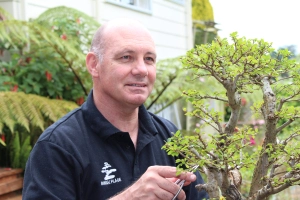Month January 2017
Master, Apprentice, Enthusiast – Bonsai Education.
It is generally accepted and published on various websites that an apprenticeship can take  between 2,000 and 12,000 hours to complete. The same websites mention that it will take between two and four years to complete an apprenticeship. It is also common knowledge that Bonsai cultivation apprenticeships can take many more years to complete than an apprenticeship for an electrician or a plumber. In my field of work, it takes four years to be trained as a teacher. This normally includes a three year degree programme as well as a one year professional Diploma in Education.
between 2,000 and 12,000 hours to complete. The same websites mention that it will take between two and four years to complete an apprenticeship. It is also common knowledge that Bonsai cultivation apprenticeships can take many more years to complete than an apprenticeship for an electrician or a plumber. In my field of work, it takes four years to be trained as a teacher. This normally includes a three year degree programme as well as a one year professional Diploma in Education.
What do we get for all of this? You normally walk away with a piece of paper that announces that you are a qualified professional, a person that can do a good job to a good standard in your chosen area of studies. You also earn a salary. I have read somewhere that a Bonsai apprenticeship could involve 10,000 hours of work and study, mainly hands-on work under the supervision of a master. We usually find that apprentices in other fields of work also work under the supervision of a specialist or a master, at least a qualified person with ample experience. Let us break 10,000 hours down to get some perspective on the time factor.
I have found all over the internet that an apprentice should not work for more than 40 hours per week. We also anecdotally know that Bonsai apprentices work for much longer hours, especially those who complete their apprenticeships in Japan. Michael Hagedorn  has written about this in his book which discusses his experiences as an apprentice in Japan. If we take a normal working week as a 40 hour work week, 10,000 hours will equate to 250 weeks and if we work for 50 weeks per year, this equates to 5 years. This is hard, physical work and one wonders why it takes so much longer than other apprenticeships. The only thing that I can think of is that it is so much more than just the technical aspects of Horticulture that must be mastered. The artistic and cultural side of things probably takes a lot longer to master than the mere application of wire, watering, pruning, fertilizing and a whole host of other things that are needed to keep a tree alive.
has written about this in his book which discusses his experiences as an apprentice in Japan. If we take a normal working week as a 40 hour work week, 10,000 hours will equate to 250 weeks and if we work for 50 weeks per year, this equates to 5 years. This is hard, physical work and one wonders why it takes so much longer than other apprenticeships. The only thing that I can think of is that it is so much more than just the technical aspects of Horticulture that must be mastered. The artistic and cultural side of things probably takes a lot longer to master than the mere application of wire, watering, pruning, fertilizing and a whole host of other things that are needed to keep a tree alive.
I assume that it takes many years of cultivating Bonsai before one can be considered to be a Master Bonsai Practitioner. How many years? I have no idea. Must you go through an official apprenticeship to work towards Master status? Anecdotally, yes, but again, I do not know, but can guess that it is not necessary. In Japan these things are controlled by the Nippon Society and I can understand why. There is nothing like that in other areas of the World. Does an apprenticeship in Europe or the USA, under a practitioner who knows his business and has a proven track record, carry the same status as an apprenticeship done in Japan? A Bachelors or Masters degree from a well recognized university anywhere in the world do carry the same status. Most countries now have a Qualifications Authority which assess these things and recognize similar qualifications across the globe. Is it time that the same happens for Bonsai studies? In the mean time, where does this leave an enthusiast who just engages in his Bonsai as a hobby? Does it matter? No, I do not think so as these people (I am one of them with a little business on the side) cultivate Bonsai for reasons that have nothing to do with the commercialization of Bonsai. And that brings me to my summary.
Does the proliferation of Bonsai “courses”, both in residence as well as online, show us that Bonsai and the educational opportunities that do arise from the wider commercialization of Bonsai across the world is maturing into a world-wide commercial empire? If this is the case, then the management or control of what these courses look like, minimum requirements as well as qualifications achieved, will need a good look at and probably needs to be standardized. Out of these educational encounters, titles come to the fore. Who then is a Master, an Apprentice, a Technologist or a Hobbyist / Enthusiast?





